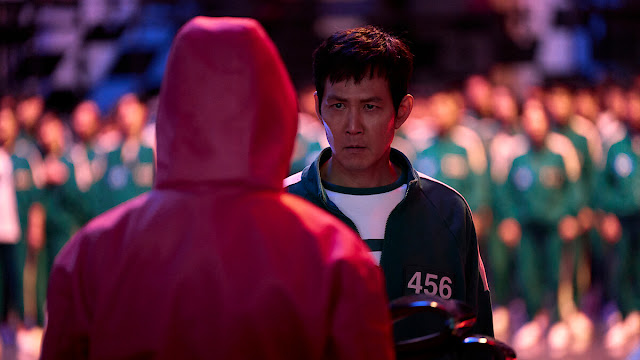When Squid Game took the world by storm back in September 2021 I was way behind the curve and was probably one of the last people on the planet to see it. Story of my life as I always seem to start binge-watching series the second they start to dip in public popularity but thankfully for me Squid Game stayed very relevant for a very long time.
That was the only thought racing through my mind as I started the second season of Squid Game. Released in 2021, the first season became a worldwide phenomenon—so much so that I need not remind you of its immense popularity.
Stars: Lee Jung-jae, Wi Ha-joon, Lee Byung-hun
What's important, however, is the context of my opinion. Like most people, I fell in love with the first season (I even re-watched it to get my parents into it, and they loved it too!). I was eager to see where the story would go next.
Interestingly, I never wrote a review for the first season. I remember saying in a post that I don't like to write reviews unless I have something new to add. The first season was already being described with all the right adjectives—refreshing, gripping, innovative—and it didn't feel necessary to rehash what had already been said.
But that brings us to the second season, which faces an entirely different challenge: justifying its existence while proving it has more to say. The bar was already sky-high, and while Season 2 is brilliantly executed, it raises the question—does the story really need to stretch beyond this season?
So, how could Season 2 possibly replicate this success? That was the question I kept pondering after its announcement. Ironically, the mere existence of a second season seemed to undercut the very message the first season sought to criticize. What was once a sharp commentary on the cycle of exploitation, greed, and human desperation now risks becoming part of that same cycle.
Then again, money is money, and no one, especially Hwang Dong-hyuk (the creator of the show), could have predicted how massive the first season would become. So, it's not my job to dwell on the irony of it all but to review what's actually here.
Season 2 of Squid Game is brilliantly executed. It doesn't feel like a forced follow-up. Instead, it continues to build on the world established in the first season and, most importantly, uses the games to advance the story in meaningful ways. Hwang Dong-hyuk deserves immense credit for this because, as I've pointed out, the arrival of a second season could have easily undermined the core messages of the first.
As inevitable as a second season was after the success of the first, it could have easily taken many different directions. The simplest route would have been to offer more games and fan-favorite moments, like the deaths of beloved characters, without real emotional stakes. Instead, the series remains true to its roots, exploring deeper themes of greed, power, and humanity.
The first two episodes of Season 2 stand out for being exciting and engaging while taking place outside the games. Hwang Dong-hyuk introduces new side characters who are all well-developed and relatable. He has a unique ability to make you care about characters, even when you're not sure what their names are.
One standout improvement is how the brother subplot, which felt tagged on in the first season, is now fully integrated into the narrative. This added depth elevates the stakes of the show, turning what could have been a minor detail into an essential element of the story.
Beyond the question of whether a continuation was necessary, the first season felt like a well-rounded story with a satisfying conclusion. In contrast, even before starting the first episode of Season 2, I already knew a third season was in the works.
I have praised the season for following up on the first so seamlessly, but what it doesn't do is stick the landing. It does such a good job in finding a reason to exist that it fails to provide a strong reason why the story couldn't be wrapped up in this season.
That feels ever more present with the way in which the season ends. There is no need for a season 3 – season 2 is clearly only a half told story with the rest being left for the next season. But as I've established, whether this is the fault of anyone is questionable and more seasons were to be expected with the success of the first season
That said, Season 2 excels at keeping viewers on edge. Hwang Dong-hyuk has crafted a narrative where no character is safe, maintaining a constant sense of tension. The season builds on this strength, keeping the familiar concept fresh and engaging, especially as both the audience and the main character now know that everyone is going to die. This shared knowledge creates a unique dynamic, heightening the sense of inevitability and adding a layer of tension that shapes every moment.
The games still thrill, but they're now part of a larger, more nuanced exploration of human nature.

Comments
Post a Comment